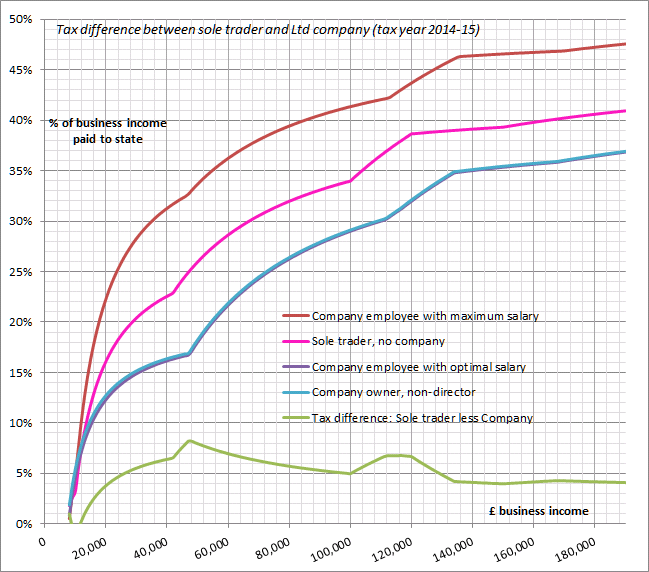Limited Company versus Sole Trader
This article is based on the tax rates applying in the UK tax year 6 April 2013 to 5 April 2014.
For a small business 'sole trader' is the simplest. There are no set up costs and it is the most common way to start out in business. Income tax is paid on all of the profits each year, whereas in a limited company it is possible to keep profits in the company which are subject to a relatively low 20% tax. This lower taxation can help provide extra working capital while the company is expanding.







The graph shows four possible business arrangements with the percentage of business income payable to the state (corporation tax, national insurance, income tax):
-
Company owner paying out all the business income in the form of salary (employer's NI has been included for). Thus after the director's salary there would be no profit chargeable to Corporation Tax. This is not a very viable arrangement due mainly to the large amounts of employer's and employee's NI
-
A sole trader: his income is subject to 9% Class 4 national insurance. This NI payment does not attach any benefit to the sole trader.
-
Company director paying himself the optimal salary and the rest of the business income is paid out in dividends. All these scenarios are based on distributing all the income to the entrepreneur which is not always desired, but it ensures comparability. Call us if you wish to know the optimal salary.
-
Company owner, not a director. This is a slightly contrived case but could occur where say the husband, a great technician, owns the company but appoints his wife, a great administrator, as sole director. The husband continues to operate under his old self-employed scheme but he charges the company the optimal fee (quite a different amount to 3 above) and pays out the rest in dividends. Call us if you wish to know the optimal annual fee!
What are the tax advantages of a limited company over sole trader?
The green line shows the savings in state taxes that can be made by changing from self employed to limited company. The savings through operating as a limited company are worth considering. There are tax advantages which the government has continued to offer for at least the last ten years. The chart shows that for a business income of £50,000 there would be a tax and national insurance saving of over £4,013 and for £26,000, a saving of £1,439. The additional administrative work relating to a limited company is minor. There are accounts to be produced under both structures. The company needs to send an annual return giving details of director, address of company. This return can be done online for a fee of £14. There is no cost of registering a newly-created company other than any fee paid to an incorporation agent, typically £30-£40.
It is important for a company to observe filing dates for accounts and tax returns as there are penalties for late filing.
A limited company structure may be looked upon more favourably when applying as an individual for credit or a mortgage since you will be classed as an employee of the company. However where the company itself wishes to apply for finance, a personal guarantee from the director is usually required. In this case the company owner will not be entirely protected against any financial failure of the company.
As a director of a limited company there will be protection for the director against any financial claims against the company in the event of failure, but this is provided the failure happened in good faith and there was not fraudulent trading or wrongful trading. Wrongful trading can include the act of continuing to trade when the company has become clearly unprofitable or insolvent.
The interest costs on a loan to a company are much more likely to be accepted for tax purposes than on a loan made to a sole trader where it might be held the finance had to some degree benefited the trader.